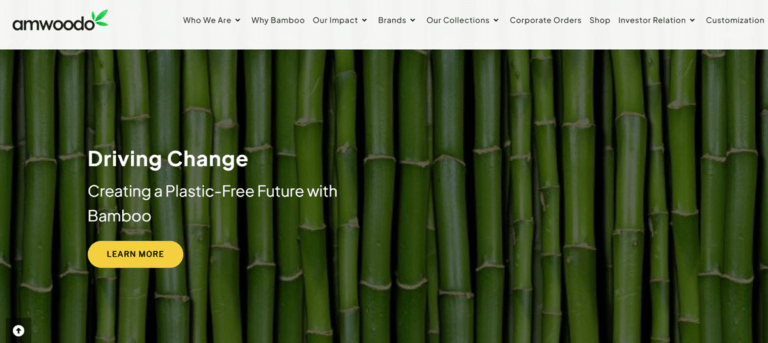Mahatma Gandhi once said, “Be the change that you wish to see in the world.” Agni is living this quote.
Agni Mitra, an engineer from Kolkata started his journey when he went to Germany for a masters degree in medical photonics. While completing his education, a life changing idea struck his mind which later turned out to be his startup Amwoodo Eco Products Private. Amwoodo promotes bamboo as a plastic substitute and addressed India’s plastic waste problem.
| Startup Name | Amwoodo Eco Products Private Limited |
| Founders | Agni Mitra |
| Industry | Sustainable Products |
| Company Classification | Private Limited |
| Headquarters/based-in | Kolkata, West Bengal, India |
| Idea | To reduce plastic pollution by manufacturing sustainable and affordable alternative products. |
| Revenue | FY23-24 Rs 22 crore |
| Date of Commencement | 2019 |
| Investments | Started with an investment of Rs 10,000. |
| Number of Customers | 1 million+ (15 million B2C and 47,000+ B2B clients) |
| Number of Employees | Internal team 40 people; including others, 76 people, estimated. |
Competitors: Beco, Bamboo India, Boocane, Bambrew, Cirkla, and Paptic.
The Problem: Why Does This Matter?
India, just like other countries faces huge plastic pollution. Despite numerous efforts and government schemes and initiatives, it has been difficult to control pollution.
Quick Fact: Ashwini Kumar Choubey, the Minister of State in the Ministry of Environment, Forest and Climate Change, cited in a report that India produced 34.7 lakh tonnes per annum (TPA) of plastic waste in 2019-2020.
The National Center for Coastal Research’s study stated that plastic litter collected from the beaches reached from 40% to 96%.
There is a huge gap between sustainable products, expensive prices, and local masses.
Companies boasting about their green practices are actually importing their products from China and other countries. There is little to no India-made products in the sustainability industry. Moreover, with sustainable products’ prices as high as sky, people consider sustainable practices as a luxury in India.
The Solution: Amwoodo Eco Products Private Limited
In Germany, while pursuing higher education, Agni realized that there was a huge difference in terms of sustainability in both countries. He noticed that Germans incorporated sustainability in their daily routines and habits. Later in 2017, he went to Sweden to meet a friend, which encouraged him to adopt sustainable practices.
Over his entire stay in Europe, Agni realized that people there were generating little to no plastic waste in comparison to India.
Weeks before the pandemic, Agni returned to India for a short holiday but that turned out to be a long stay.
He realized that there is no set time as to when things would return to normal. With lots of time on hand, Agni decided to use his knowledge and start something in the sustainability field.

Before starting, Agni explored the market to understand the price of sustainable products and was shocked to find that the retail price of a bamboo toothbrush is nearly Rs 100.
Agni realized the gap and understood the strategy to be followed: establish sustainable venture whlie prioritizing affordability.
Thus, in 2019, with an investment of Rs 10k and a lot of products to be offered, Amwoodo was launched.
In 2020, Amwoodo started supplying self-care products to partnered companies. Eventually, in the third year, the business performed so well that they started partnering with the hospitality industry.
Business Model: How Do They Make Money?
Amwoodo operates within a 6000 sq ft manufacturing unit managed by a team of 40. The company now caters to 500 B2B orders, and thousands of B2C orders, from India and Dubai, Slovakia, Malaysia, Germany, Singapore, and UK.
The market for wet hotel amenities is wide, Agni focused on the dry amenities market. He succeeded in substituting the items with bamboo alternatives but with matched prices. This step fell into alignment of the plastic ban by the government during the same time, due to which single-use plastic items were not allowed.
In FY22, the company’s turnover was Rs 2.65 crore.
In FY23-24, the company generated Rs 22 crore in revenue, and it aims to achieve Rs 100 crore turnover in the coming financial years.
Challenges/Struggles: What Roadblocks Are They Facing?
The initial days were not easy as the pandemic posed a hindrance in the progress of the venture. The market was not very welcoming at that time. Until October 2020, Amwoodo hardly progressed.
Agni spent 2 years on market research and product launches. Then, he started full-scale manufacturing at Amwoodo after partnering with market giants like Himalaya, Godrej, First Cry, etc.
Since these companies were already looking for a breakthrough in the sustainability market, Amwoodo provided a pathway for them.
Future Vision: What’s Next?

Presently, 100+ Indian corporates and hotel chains are the clients of Amwoodo, ranging from self-care products to cosmetics. However, the startup aims to reach out to more customers both national and international.
Furthermore, while spreading sustainability, Agni wants to eradicate the plastic pollution from India.
Key Takeaways: Why Should Users Care?
- We should put our knowledge to the best possible use.
- Do not waste time, use it to be productive.
- Be productive in a field which you find interesting and useful to all.
- Getting impressed is easy but following the suite and encouraging others to do the same is a productive move.
- Look around, you will find what you want to change.
- Look and work with like-minded people and partners.





Companies boasting about their green practices are actually importing their products from China and other countries. There is little to no India-made products in the sustainability industry. Moreover, with sustainable products’ prices as high as sky, people consider sustainable practices as a luxury in India.